Unit 6 When was it invented?知识讲解(共58张PPT)
文档属性
| 名称 | Unit 6 When was it invented?知识讲解(共58张PPT) | 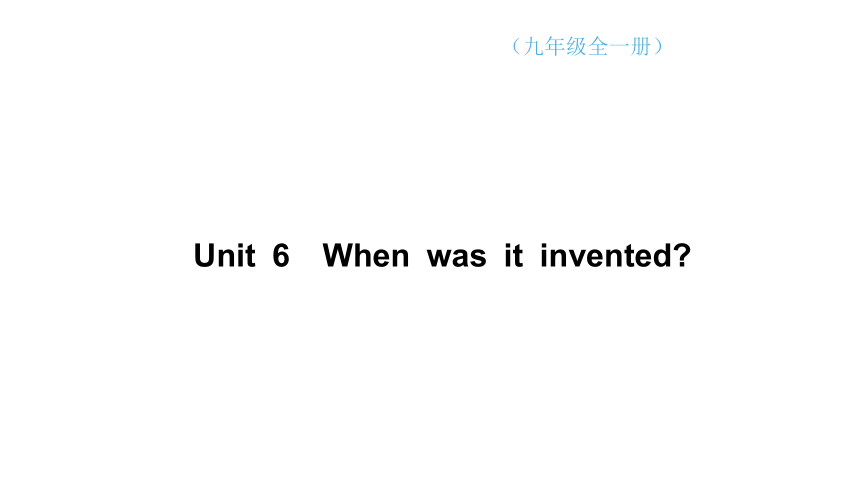 | |
| 格式 | pptx | ||
| 文件大小 | 365.1KB | ||
| 资源类型 | 教案 | ||
| 版本资源 | 人教新目标(Go for it)版 | ||
| 科目 | 英语 | ||
| 更新时间 | 2024-05-20 15:02:48 | ||
图片预览

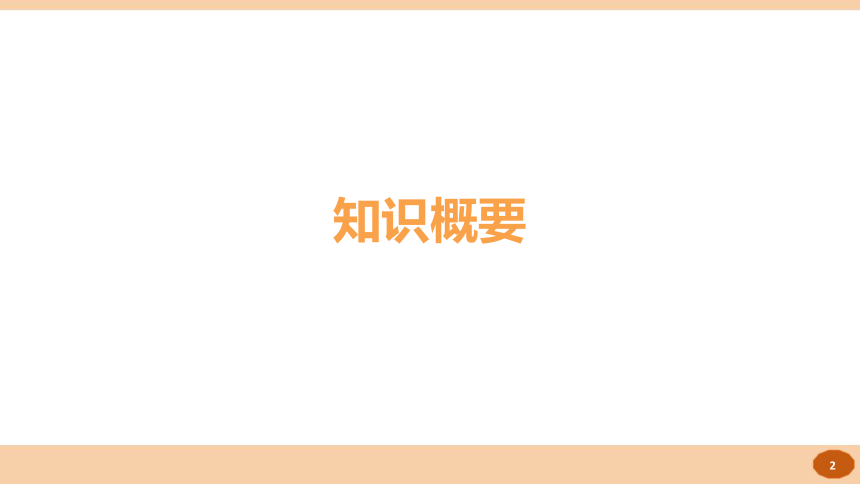
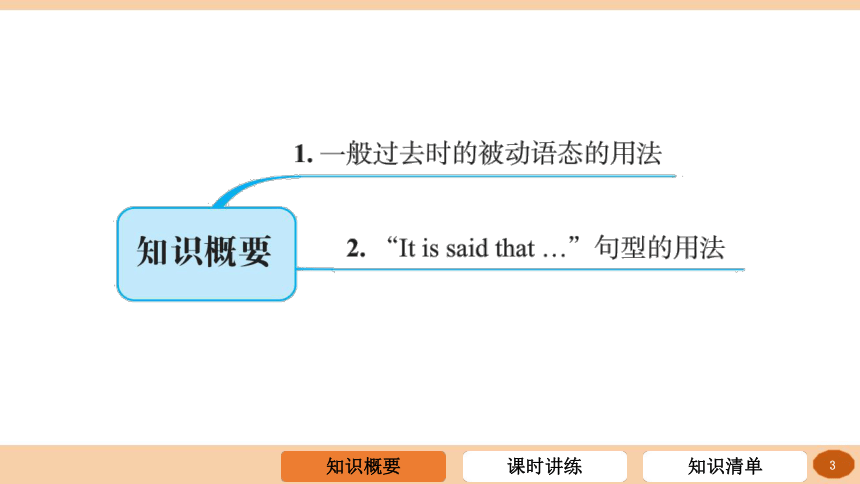
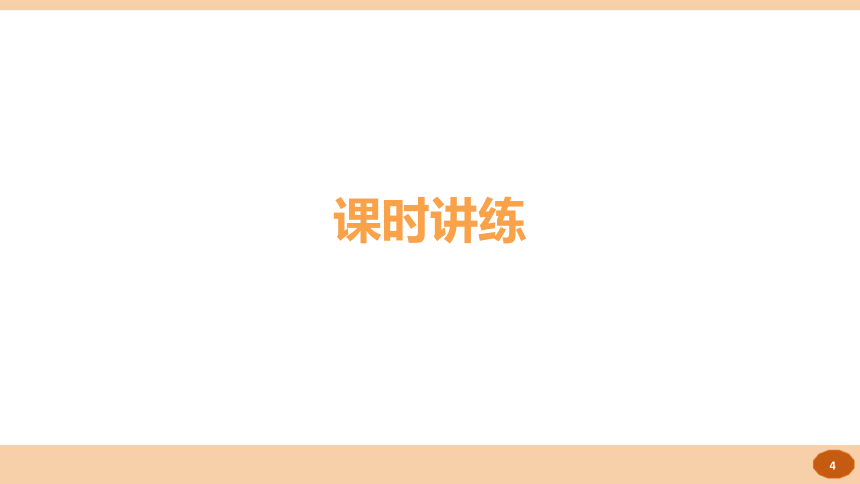
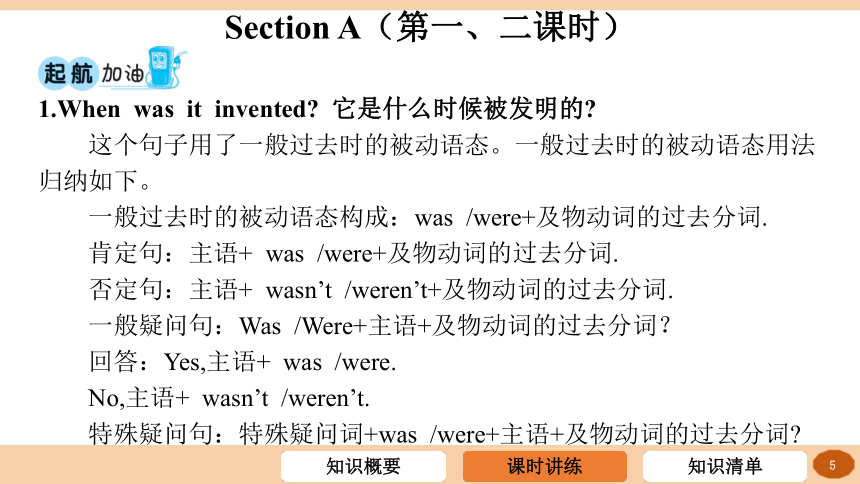
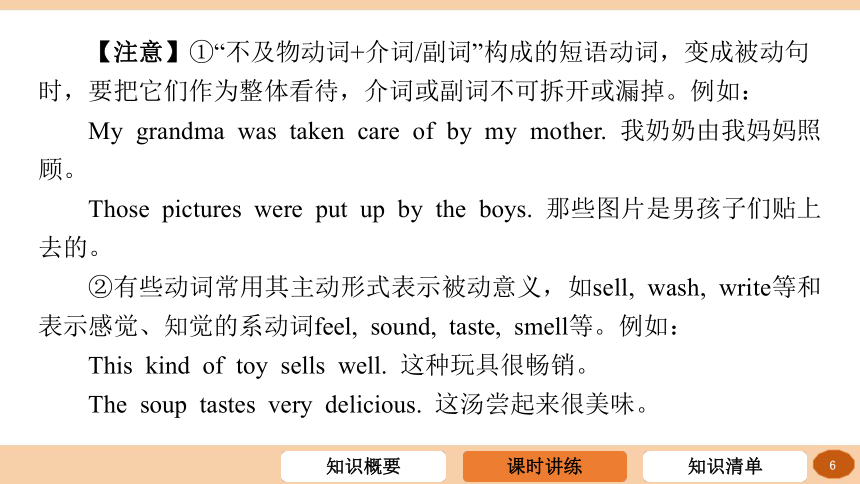
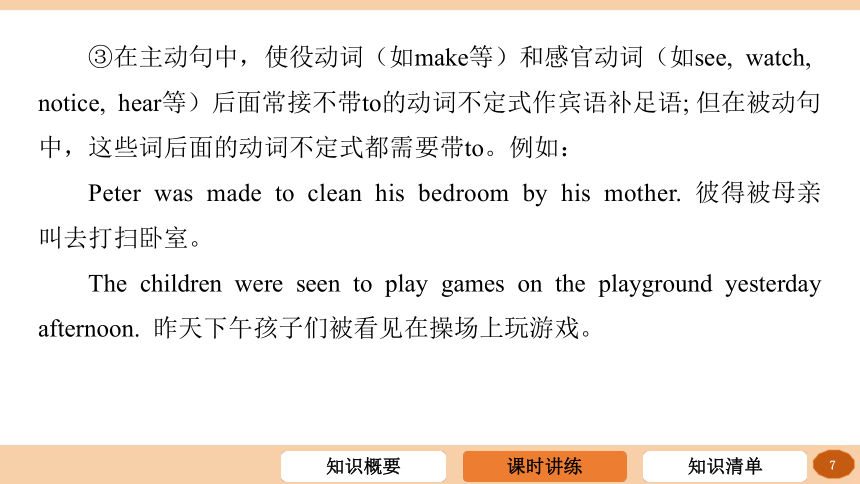
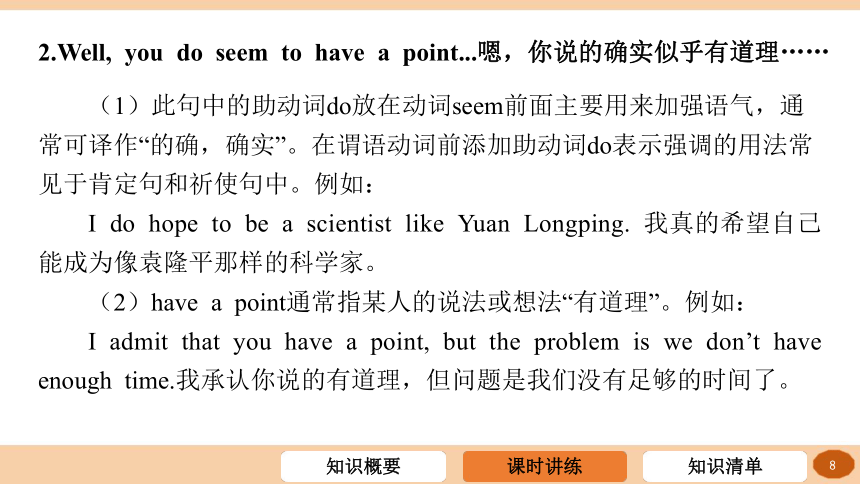
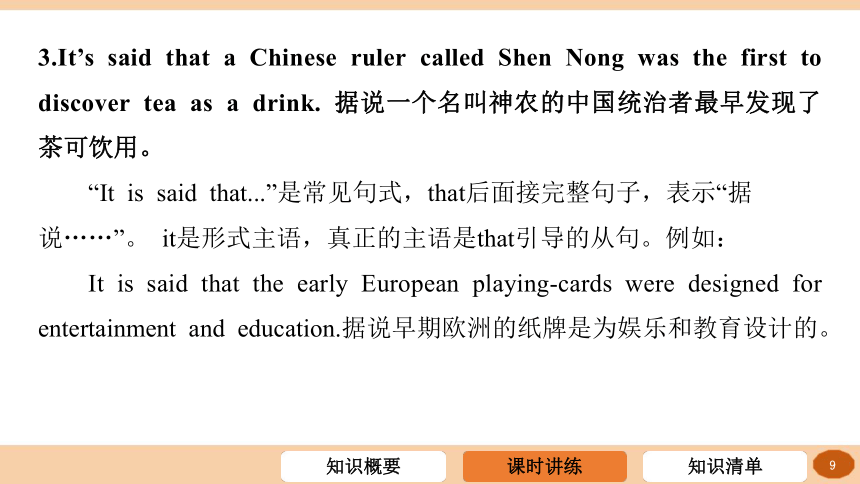
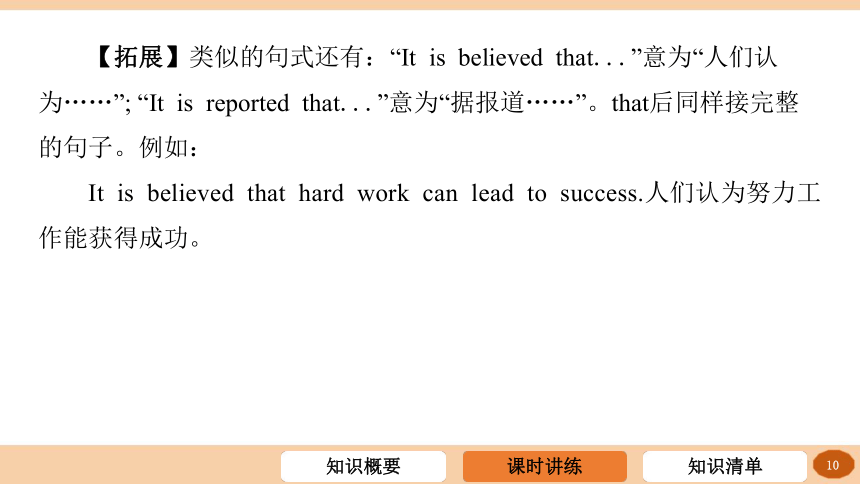
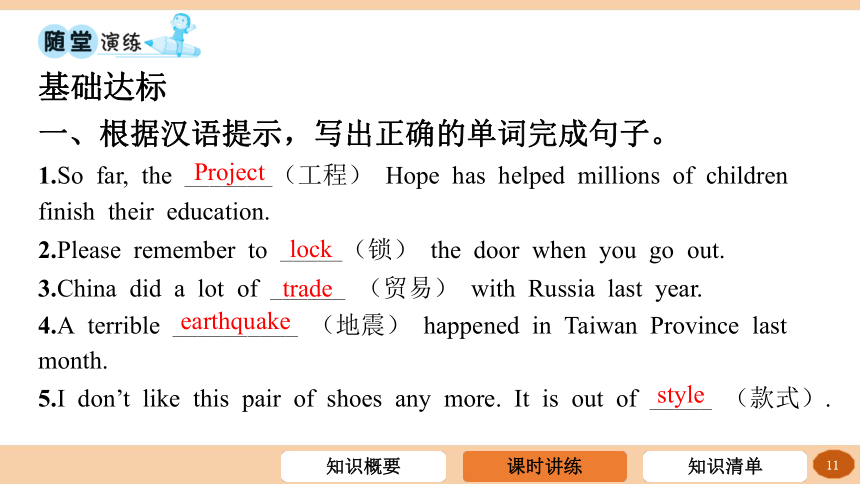
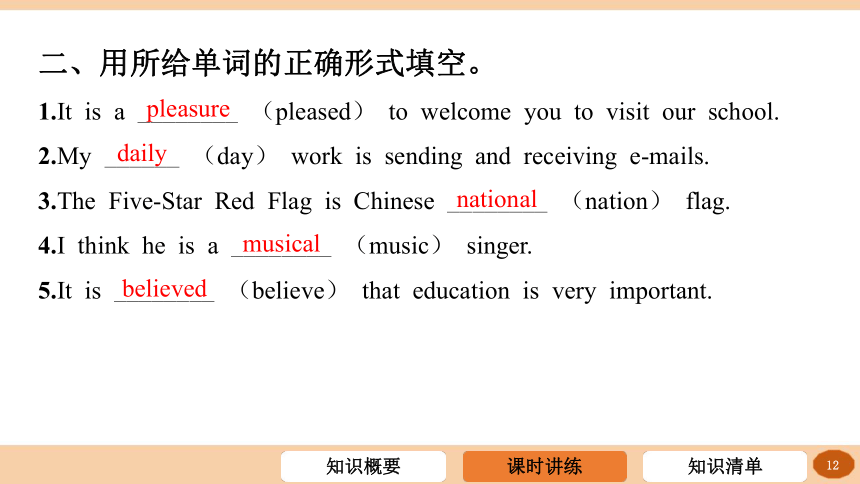
文档简介
(共58张PPT)
Unit 6 When was it invented
知识概要
课时讲练
1.When was it invented 它是什么时候被发明的
这个句子用了一般过去时的被动语态。一般过去时的被动语态用法归纳如下。
一般过去时的被动语态构成:was /were+及物动词的过去分词.
肯定句:主语+ was /were+及物动词的过去分词.
否定句:主语+ wasn’t /weren’t+及物动词的过去分词.
一般疑问句:Was /Were+主语+及物动词的过去分词?
回答:Yes,主语+ was /were.
No,主语+ wasn’t /weren’t.
特殊疑问句:特殊疑问词+was /were+主语+及物动词的过去分词
Section A(第一、二课时)
【注意】①“不及物动词+介词/副词”构成的短语动词,变成被动句时,要把它们作为整体看待,介词或副词不可拆开或漏掉。例如:
My grandma was taken care of by my mother. 我奶奶由我妈妈照顾。
Those pictures were put up by the boys. 那些图片是男孩子们贴上去的。
②有些动词常用其主动形式表示被动意义,如sell, wash, write等和表示感觉、知觉的系动词feel, sound, taste, smell等。例如:
This kind of toy sells well. 这种玩具很畅销。
The soup tastes very delicious. 这汤尝起来很美味。
③在主动句中,使役动词(如make等)和感官动词(如see, watch, notice, hear等)后面常接不带to的动词不定式作宾语补足语; 但在被动句中,这些词后面的动词不定式都需要带to。例如:
Peter was made to clean his bedroom by his mother. 彼得被母亲叫去打扫卧室。
The children were seen to play games on the playground yesterday afternoon. 昨天下午孩子们被看见在操场上玩游戏。
2.Well, you do seem to have a point...嗯,你说的确实似乎有道理……
(1)此句中的助动词do放在动词seem前面主要用来加强语气,通常可译作“的确,确实”。在谓语动词前添加助动词do表示强调的用法常见于肯定句和祈使句中。例如:
I do hope to be a scientist like Yuan Longping. 我真的希望自己能成为像袁隆平那样的科学家。
(2)have a point通常指某人的说法或想法“有道理”。例如:
I admit that you have a point, but the problem is we don’t have enough time.我承认你说的有道理,但问题是我们没有足够的时间了。
3.It’s said that a Chinese ruler called Shen Nong was the first to discover tea as a drink. 据说一个名叫神农的中国统治者最早发现了茶可饮用。
“It is said that...”是常见句式,that后面接完整句子,表示“据说……”。 it是形式主语,真正的主语是that引导的从句。例如:
It is said that the early European playing-cards were designed for entertainment and education.据说早期欧洲的纸牌是为娱乐和教育设计的。
【拓展】类似的句式还有:“It is believed that...”意为“人们认为……”; “It is reported that...”意为“据报道……”。that后同样接完整的句子。例如:
It is believed that hard work can lead to success.人们认为努力工作能获得成功。
基础达标
一、根据汉语提示,写出正确的单词完成句子。
1.So far, the _______(工程) Hope has helped millions of children
finish their education.
Project
2.Please remember to _____(锁) the door when you go out.
lock
3.China did a lot of ______ (贸易) with Russia last year.
trade
4.A terrible __________ (地震) happened in Taiwan Province last
month.
earthquake
5.I don’t like this pair of shoes any more. It is out of _____ (款式).
style
二、用所给单词的正确形式填空。
1.It is a ________ (pleased) to welcome you to visit our school.
pleasure
2.My ______ (day) work is sending and receiving e-mails.
daily
3.The Five-Star Red Flag is Chinese ________ (nation) flag.
national
4.I think he is a ________ (music) singer.
musical
5.It is ________ (believe) that education is very important.
believed
三、单项选择。
1.—________ is said that we’ll have a sports meeting next
week.( )
—Sounds great!
A
A.It B.One C.This
2.Great changes ________ in my hometown in the last ten
years.( )
C
A.have been happened B.have been take place C.have taken place
&1& happen强调“碰巧发生”; take place 指事情有计划、有安排地发生; happen与take place均无被动语态。
3.—What’s up, Julia
—Well, I need ________ to help me carry the heavy box.( )
C
A.everybody B.anybody C.somebody
4.The price of the houses in the big cities is so ________ that most
young people can’t afford one.( )
B
A.expensive B.high C.cheap
5.—What do you think is the most important invention in our daily
life
—It’s ________ doubt the mobile phone. We use it every day.( )
A
A.without B.except C.against
6.—How did you know my brother joined the army
—I met your mother ________ last week, and she told me about
it.( )
C
A.at last B.by mistake C.by accident
7.—What do you think of it
—I haven’t had it yet. Anyway, it ________ delicious.( )
C
A.is smelling B.will smell C.smells
8.Although her two children moved to the big city, she still decided to
________ in the small village because she loved the fresh air
there.( )
B
A.go B.remain C.arrive
9.I didn’t wake up in the morning ________ the alarm clock
rang.( )
C
A.since B.after C.until
10.A new club ________ in our school at the beginning of this year
and now it has many members.( )
C
A.is started B.has started C.was started
能力训练
四、从方框中选择恰当的选项,补全对话。有一项多余。
A: Hello, John! 1.(. .). .
B: I think the bicycle is the most useful invention.
A: 2.(. . .).
.B: It was invented in the
18th century by Delaisse,
a German inventor.
B
E
A. Can you ride a bicycle
B. What do you think is the most useful
invention
C. When and where shall we meet
D. What about going cycling
E. When was it invented
F. Would you like to have a try
A: 3.(. .). .
B: Yes, I can. Riding is my favorite sport.
A
A: It’s said that the shared bikes in the street are very convenient.
4.(. .). .
B: Sure, I’d love to. 5.(. . .). .
A: Let’s meet at People’s Square
at 4:00 pm.
B: OK.
F
C
A. Can you ride a bicycle
B. What do you think is the most useful
invention
C. When and where shall we meet
D. What about going cycling
E. When was it invented
F. Would you like to have a try
Section B(第三、四课时)
1.Potato chips were invented by mistake. 薯条是阴差阳错被发明出来的。
by mistake是介词短语,意为“错误地; 无意中”,在句中作状语。 例如:
I’m very sorry I took your pen by mistake.真地很抱歉,我错把你的钢笔拿走了。
2.Basketball has not only become a popular sport to play, but it has also become a popular sport to watch. 篮球不仅成为人们喜欢玩的运动项目,而且人们也喜欢观看这种运动。
“not only...but also”意为“不但……而且……”,用于连接两个相同的句子成分。若连接两个主语,谓语动词与其靠近的主语保持一致。例如:
Not only the students but also the teacher likes table tennis.不仅学生们喜欢乒乓球,老师也喜欢。(连接两个主语)
Mr. Zhang not only plays well, but also writes music.张先生不仅很会演奏,而且还会作曲。(连接两个谓语动词)
I like not only apples but also strawberries.我不但喜欢苹果而且喜欢草莓。(连接两个宾语)
We speak English not only in class but also after class.我们不仅在课堂上说英语,而且在课后也说。(连接两个地点状语)
3.Many young people look up to these basketball heroes and want to become like them.许多年轻人都仰慕这些篮球英雄,并想成为像他们一样的人。
look up to 意为“钦佩; 仰慕”。例如:
We all look up to our math teacher.我们都很敬重我们的数学老师。
If you want to be looked up to, you should own real ability.如果你想让别人佩服你,你必须具有真正的实力。
【拓展】look构成的词组:
look after照顾
look up 查阅; 抬头看
look like 看上去像
look back回头看; 回顾
look through 浏览; 透过……看
look down upon (on)看不起,轻视
look forward to 盼望,期待
look into朝……看去; 调查
look on 旁观,观望
look out 当心,小心,留神
4.These stars encourage young people to work hard to achieve their dreams. 这些球星激励着年轻人努力学习,去实现他们的梦想。
encourage sb. to do sth.意为“鼓励某人做某事”,动词不定式作宾语sb.的补足语。例如:
My father often encourages me to take part in out-of-class activities.我父亲经常鼓励我参加课外活动。
基础达标
一、根据汉语提示,写出正确的单词完成句子。
1.Beijing is the only city which has held both summer and winter
_________(奥林匹克运动会).
Olympics
2.Our class are ________(分开) into six groups.
divided
3.The lemon tastes very _____(酸的).
sour
4.As a businessman, you must be kind and friendly to your
__________ (顾客).
customers
5.There are only a few apples in the _______ (篮子).
basket
二、用所给单词的正确形式填空。
1.Wow! The noodles taste so _____ (salt). You must put too much
salt.
salty
2.Norman Bethune is a _________ (Canada)doctor.
Canadian
3.Qiu Shaoyun, Luo Shenjiao, together with Mao Anying is our
national _______ (hero).
heroes
4.My dream is to be a ___________ (profession)basketball player.
professional
5.The __________ (popular)of the smart phones has made people’s
life much easier than before.
popularity
三、单项选择。
1.Becky’s parents always encourage her ________ out her
opinions.( )
B
A.speak B.to speak C.speaking
2.The students in this school are made ________ school uniforms on
Mondays.( )
C
A.wear B.wearing C.to wear
&2& make用作使役动词,后面接不定式的复合结构作宾语时,主动语态中要不要带to呢?被动语态中要不要带to呢?
3.My grandmother looks young. In fact, she is ________ seventy years
old.( )
B
A.hardly B.nearly C.even
4.Our team needs some players for the football game. So ________
you ________ Tom can join us.( )
A
A.not only; but also B.neither; nor C.either; or
5.In our school library, there ________a number of books on history
and the number of them ________ growing larger and larger.( )
C
A.is; are B.is; is C.are; is
6.Zhong Nanshan is ________ by many people in our whole
country.( )
C
A.looked for B.looked around C.looked up to
7.Please stop those children ________ in the river. It was too
dangerous.( )
C
A.swim B.swum C.from swimming
8.The car stopped suddenly. There ________ be something wrong with
its engine.( )
B
A.can B.must C.should
9.—What did Mary say in her letter
—She wanted to know ________.( )
B
A.when was the tea invented
B.who invented the kite
C.where the tooth brush is invented
10.Last March, many trees and flowers ________ along the roads to
make our city more beautiful.( )
B
A.planted B.were planted C.were planting
能力训练
四、从方框内选择适当的单词,并用其正确形式填空。
beginning only its later shape
by daily list low invent
The piano gets popular. Playing the piano has even become part
of some people’s 1.______life. But how much do you know about
2.____ history
daily
its
The piano was thought to be 3. _________by an Italian called
Bartolomeo Cristofori. He was once a maker of musical instruments.
Although it was invented at the 4.__________ of the 18th century, it
wasn’t popular until fifty years 5._____. It’s said that the first time
that the piano was played in a public concert in London was in 1768.
And it was played 6.____ Johann Christian Bach. When the piano was
brought to China, they were expensive and 7._____ rich people could
buy one. But now their price is much 8.______ than before.
invented
beginning
later
by
only
lower
beginning only its later shape
by daily list low invent
Today the piano comes in many different styles,9._______ and
sizes. What’s more, in our country the piano is 10. ______one of the
optional (选修的) subjects in some schools and many children begin
to learn how to play it at an early age.
shapes
listed
beginning only its later shape
by daily list low invent
Self Check(第五课时)
本单元以“发明”为话题,谈论了一些发明的历史。要求掌握一般过去时的被动语态,具体到书面表达中,要求能熟练地用英语写出有关介绍某项发明的短文。在介绍某项发明时,要求能够介绍该项发明的发明时间、构成材料、外观、用途等。
1.教材中出现的相关句型:
(1)I think... is a very useful invention.我认为……是一项很有用的发明。
(2)... was invented by... ……是由……(某人)发明的。
(3)... was invented in... ……是在……(某时间)发明的。
(4)It is/ was used for... 它(过去)被用来……
(5)... is made of... ……是由……(材料)制成的。
2.拓展的常用句型:
(1)... is / are special because... ……是很特别因为……
(2)... is /are made in... ……由……(某地)制造。
(3)It’s said/ believed that... 据说……/人们认为……
(4)... is / are good for... ……对……有好处。
(5)...is / are seen as... ……被看作……
能力训练
一、从方框中选择恰当的选项,补全对话。有一项多余。
[In the history museum.]
A: Wow, there are so many things on display.
B: Yeah. They were all used hundreds of years ago.
A: Look at the hat. 1.(. .). .
B: Of course not.
D
Shall we go to see other
things over there
B. What was it used for
C. Where was it used
D. Was it worn by the kings in
ancient times
E. What was it made of
F. It was used for drinking.
A: 2.(. .).
.B: It was used in plays.
A: In plays How interesting! 3.(. . .). .
B: It was made of yellow silk.
A: Oh, what’s that
C
E
B: It’s a cup. 4.(. . .). .
A: But I think it’s better to use glasses for drinking.
B: I agree. 5.(. .). .
A: OK! Let’s go.
F
A
A. Shall we go to see other things over there
B. What was it used for
C. Where was it used
D. Was it worn by the kings in ancient times
E. What was it made of
F. It was used for drinking.
素养提升
二、完形填空。
Kevin Moseley is an inventor. He has turned his invention into a huge business success. A few years ago, Kevin came up with the idea of creating a shark fin (鲨鱼鳍) to help children learn to . .1. .. He named it SwimFin.
Later, Kevin developed a business plan for his idea and went on a . .2. . for investment (投资). On the show, some people . .3. . that
his idea was dangerous and they even made a couple of jokes. They said . .4. . would buy such a “silly” thing. “I went on the show . .5. . I was not a businessman,” Kevin said. “I needed the . .6. . and advice, but I was made to feel like a poor little schoolboy.”
However, Kevin decided not to give up. “That experience made me want to succeed. I realized that I did have a good . .7. . that would help children learn to swim, so I decided to carry on . .8. ..”
Kevin raised about £200,000 . .9. . the new business. He started a company, SwimFin Ltd, in the garage (车库) of his home.
In just one year, Kevin made about £70,000 and his product became very . .10. .. One year later, SwimFin was a £100,000 business and a worldwide success.
1.( ) A.skate B.swim C.count
B
2.( ) A.market B.program C.trip
B
3.( ) A.introduced B.checked C.warned
C
4.( ) A.nobody B.somebody C.anybody
A
5.( ) A.so B.but C.because
C
6.( ) A.tool B.partner C.money
C
7.( ) A.product B.background C.course
A
8.( ) A.halfway B.alone C.instead
B
9.( ) A.under B.from C.for
C
10.( ) A.educational B.natural C.popular
C
三、阅读理解。
Some inventions are so useful, but seem so simple, that we wonder why no one thought of them long ago. Post-it Notes—the pieces of paper that you can fasten almost anywhere and then remove without leaving any sign that they were there—are an example of such an invention.
Post-it Notes were invented about twenty years ago by Art Fry, a scientist at 3M Corporation. The idea for the product came from a
frustrating(令人沮丧的) experience he often had while singing in his church choir(唱诗班). Fry used pieces of paper as bookmarks to mark the places in his book of songs, but these bookmarks were always falling out. He knew he needed a bookmark that would stay where he put it, but that he could remove without damaging the pages.
Around the time, Fry heard about a new adhesive (黏合剂) that a colleague(同事), Dr. Spence Silver, had created. This adhesive was special because it was sticky, but not too sticky. It was strong enough to hold papers together, but weak enough not to tear the paper when it
was removed. Fry saw that the new adhesive could help solve his bookmark problem. One morning, Fry put some of the adhesive on the edge of a piece of paper. Just as he hoped, it made a perfect bookmark.
Fry and some other people at 3M believed so much in the new product that they persuaded the company to give away thousands of the “sticky pieces of paper” for trial use. When some salespeople at 3M went to offices and showed workers just how helpful the new type of notes could be, they immediately received many orders. As more and more people discovered how useful Post-it Notes could be, the product took off.
( ) 1.The invention of Post-it Notes showed that Art Fry ________.
C
A.had a lot of knowledge
B.was very hard-working
C.was good at creative thinking
( ) 2.In what way did Dr. Spence help Art Fry
B
A.They worked together and discussed science.
B.His invention of a special adhesive made Fry’s invention possible.
C.He persuaded 3M Corporation to give away lots of Post-it Notes for trial use.
( ) 3.Which of the following is a possible use of Post-it Notes
C
A.An email to a friend.
B.An ad in a newspaper.
C.A note on a friend’s door.
( ) 4.The underlined phrase“took off” means “________”.
A
A.became popular quickly
B.had even more uses
C.disappeared from the market
四、书面表达。
我们身边有着各种各样的小发明,它们虽然看起来不起眼,但在我们的日常生活中却有着很大作用。请你以“A small invention that I love most”为题,提供收集资料,结合下面提示,写一篇80词左右的英语短文,介绍一件这样的小发明。
提示:1. What’s the invention
2.Who was it invented by
3.How was it invented
4.What’s it used for
#b#
_____________________________________________________________
____________________________________________________________________________________________________________________________________________________________________________________________________________________________________________________________________________________________________________________________________________________________________________________________________________________________________________________________________________________________________________________________________________________________________________________________________________________________________________
A small invention that I love most
Although a lot of inventions are small, they’re very useful for people’s life. One of my favorite small inventions is the ballpoint pen. It is used for writing.
The modern ballpoint pen was invented by László Bíró. While he worked as a reporter in Hungary, he noticed that the ink used in newspaper printing dried quickly. He tried to use the same ink in a pen and developed a special pen tip. This new kind of pen was called a ballpoint pen. We can take it wherever we go, without taking ink bottles.
One possible version:
#b#
______________________________________________________________
______________________________________________________________
The ballpoint pens are not only cheap but also convenient, so they are widely used by both students and adults around the world.
知识清单
Unit 6
重点短语
1.____________有道理
have a point
2.____________偶然; 意外地
by accident
3.______________被广泛使用
be used widely
4._________掉入,陷入
fall into
5.__________发生
take place
6.____________________虽然,尽管
even though=even if
7.___________茶文化
tea culture
8._______________毫无疑问; 的确
without doubt
9._______________突然; 猛地
all of a sudden
10.______________把……翻译为……
translate...into
11._________________少/多于
less/more than
12._____________错误地; 无意中
by mistake
13.____________把……分开
divide...into
14.________________同时
at the same time
15.__________________阻止做某事
stop from doing sth.
16.____________梦想; 梦见
dream of
17.__________直到……才
not...until
18.__________________不但……而且……
not only...but also...
19.______________……的数目
the number of
20.___________许多
a number of
21.__________钦佩; 仰慕
look up to
22._____________________鼓励某人做某事
encourage sb. to do sth.
23._____________提出,想出
come up with
It’s believed that tea was brought to Korea and Japan during the 6th and 7th centuries.
重点句型
1.______________________它是什么时候发明的
When was it invented
2._________________________你说的的确有道理。
You do seem to have a point.
3._________________________________
但在当时,它并没有被广泛使用。
But at that time, it wasn’t used widely.
4.______________________________________________________________________据说一位名叫神农的中国统治者最早发现了茶可饮用。
It’s said that a Chinese ruler called Shen Nong was the first to discover tea
as a drink.
5.__________________________________________________________________________人们认为茶是在公元6~7世纪传到了朝鲜和日本。
6.___________________________________________________________________毫无疑问,中国人才是最懂茶道的人。
The Chinese are without doubt the ones who best understand the nature of
tea.
7.__________________________________薯条是阴差阳错被发明出来的。
Potato chips were invented by mistake.
8.___________________________________________________________这些球星激励着年轻人努力学习去实现他们的梦想。
These stars encourage young people to work hard to achieve their dreams.
9.______________________________________________________________________许多年轻人敬仰这些篮球明星,想成为像他们那样的人。
Many young people look up these basketball heroes and want to become
like them.
语法要点
1.一般过去时的被动语态的用法。
2.“It is said that...”句型的用法。
Unit 6 When was it invented
知识概要
课时讲练
1.When was it invented 它是什么时候被发明的
这个句子用了一般过去时的被动语态。一般过去时的被动语态用法归纳如下。
一般过去时的被动语态构成:was /were+及物动词的过去分词.
肯定句:主语+ was /were+及物动词的过去分词.
否定句:主语+ wasn’t /weren’t+及物动词的过去分词.
一般疑问句:Was /Were+主语+及物动词的过去分词?
回答:Yes,主语+ was /were.
No,主语+ wasn’t /weren’t.
特殊疑问句:特殊疑问词+was /were+主语+及物动词的过去分词
Section A(第一、二课时)
【注意】①“不及物动词+介词/副词”构成的短语动词,变成被动句时,要把它们作为整体看待,介词或副词不可拆开或漏掉。例如:
My grandma was taken care of by my mother. 我奶奶由我妈妈照顾。
Those pictures were put up by the boys. 那些图片是男孩子们贴上去的。
②有些动词常用其主动形式表示被动意义,如sell, wash, write等和表示感觉、知觉的系动词feel, sound, taste, smell等。例如:
This kind of toy sells well. 这种玩具很畅销。
The soup tastes very delicious. 这汤尝起来很美味。
③在主动句中,使役动词(如make等)和感官动词(如see, watch, notice, hear等)后面常接不带to的动词不定式作宾语补足语; 但在被动句中,这些词后面的动词不定式都需要带to。例如:
Peter was made to clean his bedroom by his mother. 彼得被母亲叫去打扫卧室。
The children were seen to play games on the playground yesterday afternoon. 昨天下午孩子们被看见在操场上玩游戏。
2.Well, you do seem to have a point...嗯,你说的确实似乎有道理……
(1)此句中的助动词do放在动词seem前面主要用来加强语气,通常可译作“的确,确实”。在谓语动词前添加助动词do表示强调的用法常见于肯定句和祈使句中。例如:
I do hope to be a scientist like Yuan Longping. 我真的希望自己能成为像袁隆平那样的科学家。
(2)have a point通常指某人的说法或想法“有道理”。例如:
I admit that you have a point, but the problem is we don’t have enough time.我承认你说的有道理,但问题是我们没有足够的时间了。
3.It’s said that a Chinese ruler called Shen Nong was the first to discover tea as a drink. 据说一个名叫神农的中国统治者最早发现了茶可饮用。
“It is said that...”是常见句式,that后面接完整句子,表示“据说……”。 it是形式主语,真正的主语是that引导的从句。例如:
It is said that the early European playing-cards were designed for entertainment and education.据说早期欧洲的纸牌是为娱乐和教育设计的。
【拓展】类似的句式还有:“It is believed that...”意为“人们认为……”; “It is reported that...”意为“据报道……”。that后同样接完整的句子。例如:
It is believed that hard work can lead to success.人们认为努力工作能获得成功。
基础达标
一、根据汉语提示,写出正确的单词完成句子。
1.So far, the _______(工程) Hope has helped millions of children
finish their education.
Project
2.Please remember to _____(锁) the door when you go out.
lock
3.China did a lot of ______ (贸易) with Russia last year.
trade
4.A terrible __________ (地震) happened in Taiwan Province last
month.
earthquake
5.I don’t like this pair of shoes any more. It is out of _____ (款式).
style
二、用所给单词的正确形式填空。
1.It is a ________ (pleased) to welcome you to visit our school.
pleasure
2.My ______ (day) work is sending and receiving e-mails.
daily
3.The Five-Star Red Flag is Chinese ________ (nation) flag.
national
4.I think he is a ________ (music) singer.
musical
5.It is ________ (believe) that education is very important.
believed
三、单项选择。
1.—________ is said that we’ll have a sports meeting next
week.( )
—Sounds great!
A
A.It B.One C.This
2.Great changes ________ in my hometown in the last ten
years.( )
C
A.have been happened B.have been take place C.have taken place
&1& happen强调“碰巧发生”; take place 指事情有计划、有安排地发生; happen与take place均无被动语态。
3.—What’s up, Julia
—Well, I need ________ to help me carry the heavy box.( )
C
A.everybody B.anybody C.somebody
4.The price of the houses in the big cities is so ________ that most
young people can’t afford one.( )
B
A.expensive B.high C.cheap
5.—What do you think is the most important invention in our daily
life
—It’s ________ doubt the mobile phone. We use it every day.( )
A
A.without B.except C.against
6.—How did you know my brother joined the army
—I met your mother ________ last week, and she told me about
it.( )
C
A.at last B.by mistake C.by accident
7.—What do you think of it
—I haven’t had it yet. Anyway, it ________ delicious.( )
C
A.is smelling B.will smell C.smells
8.Although her two children moved to the big city, she still decided to
________ in the small village because she loved the fresh air
there.( )
B
A.go B.remain C.arrive
9.I didn’t wake up in the morning ________ the alarm clock
rang.( )
C
A.since B.after C.until
10.A new club ________ in our school at the beginning of this year
and now it has many members.( )
C
A.is started B.has started C.was started
能力训练
四、从方框中选择恰当的选项,补全对话。有一项多余。
A: Hello, John! 1.(. .). .
B: I think the bicycle is the most useful invention.
A: 2.(. . .).
.B: It was invented in the
18th century by Delaisse,
a German inventor.
B
E
A. Can you ride a bicycle
B. What do you think is the most useful
invention
C. When and where shall we meet
D. What about going cycling
E. When was it invented
F. Would you like to have a try
A: 3.(. .). .
B: Yes, I can. Riding is my favorite sport.
A
A: It’s said that the shared bikes in the street are very convenient.
4.(. .). .
B: Sure, I’d love to. 5.(. . .). .
A: Let’s meet at People’s Square
at 4:00 pm.
B: OK.
F
C
A. Can you ride a bicycle
B. What do you think is the most useful
invention
C. When and where shall we meet
D. What about going cycling
E. When was it invented
F. Would you like to have a try
Section B(第三、四课时)
1.Potato chips were invented by mistake. 薯条是阴差阳错被发明出来的。
by mistake是介词短语,意为“错误地; 无意中”,在句中作状语。 例如:
I’m very sorry I took your pen by mistake.真地很抱歉,我错把你的钢笔拿走了。
2.Basketball has not only become a popular sport to play, but it has also become a popular sport to watch. 篮球不仅成为人们喜欢玩的运动项目,而且人们也喜欢观看这种运动。
“not only...but also”意为“不但……而且……”,用于连接两个相同的句子成分。若连接两个主语,谓语动词与其靠近的主语保持一致。例如:
Not only the students but also the teacher likes table tennis.不仅学生们喜欢乒乓球,老师也喜欢。(连接两个主语)
Mr. Zhang not only plays well, but also writes music.张先生不仅很会演奏,而且还会作曲。(连接两个谓语动词)
I like not only apples but also strawberries.我不但喜欢苹果而且喜欢草莓。(连接两个宾语)
We speak English not only in class but also after class.我们不仅在课堂上说英语,而且在课后也说。(连接两个地点状语)
3.Many young people look up to these basketball heroes and want to become like them.许多年轻人都仰慕这些篮球英雄,并想成为像他们一样的人。
look up to 意为“钦佩; 仰慕”。例如:
We all look up to our math teacher.我们都很敬重我们的数学老师。
If you want to be looked up to, you should own real ability.如果你想让别人佩服你,你必须具有真正的实力。
【拓展】look构成的词组:
look after照顾
look up 查阅; 抬头看
look like 看上去像
look back回头看; 回顾
look through 浏览; 透过……看
look down upon (on)看不起,轻视
look forward to 盼望,期待
look into朝……看去; 调查
look on 旁观,观望
look out 当心,小心,留神
4.These stars encourage young people to work hard to achieve their dreams. 这些球星激励着年轻人努力学习,去实现他们的梦想。
encourage sb. to do sth.意为“鼓励某人做某事”,动词不定式作宾语sb.的补足语。例如:
My father often encourages me to take part in out-of-class activities.我父亲经常鼓励我参加课外活动。
基础达标
一、根据汉语提示,写出正确的单词完成句子。
1.Beijing is the only city which has held both summer and winter
_________(奥林匹克运动会).
Olympics
2.Our class are ________(分开) into six groups.
divided
3.The lemon tastes very _____(酸的).
sour
4.As a businessman, you must be kind and friendly to your
__________ (顾客).
customers
5.There are only a few apples in the _______ (篮子).
basket
二、用所给单词的正确形式填空。
1.Wow! The noodles taste so _____ (salt). You must put too much
salt.
salty
2.Norman Bethune is a _________ (Canada)doctor.
Canadian
3.Qiu Shaoyun, Luo Shenjiao, together with Mao Anying is our
national _______ (hero).
heroes
4.My dream is to be a ___________ (profession)basketball player.
professional
5.The __________ (popular)of the smart phones has made people’s
life much easier than before.
popularity
三、单项选择。
1.Becky’s parents always encourage her ________ out her
opinions.( )
B
A.speak B.to speak C.speaking
2.The students in this school are made ________ school uniforms on
Mondays.( )
C
A.wear B.wearing C.to wear
&2& make用作使役动词,后面接不定式的复合结构作宾语时,主动语态中要不要带to呢?被动语态中要不要带to呢?
3.My grandmother looks young. In fact, she is ________ seventy years
old.( )
B
A.hardly B.nearly C.even
4.Our team needs some players for the football game. So ________
you ________ Tom can join us.( )
A
A.not only; but also B.neither; nor C.either; or
5.In our school library, there ________a number of books on history
and the number of them ________ growing larger and larger.( )
C
A.is; are B.is; is C.are; is
6.Zhong Nanshan is ________ by many people in our whole
country.( )
C
A.looked for B.looked around C.looked up to
7.Please stop those children ________ in the river. It was too
dangerous.( )
C
A.swim B.swum C.from swimming
8.The car stopped suddenly. There ________ be something wrong with
its engine.( )
B
A.can B.must C.should
9.—What did Mary say in her letter
—She wanted to know ________.( )
B
A.when was the tea invented
B.who invented the kite
C.where the tooth brush is invented
10.Last March, many trees and flowers ________ along the roads to
make our city more beautiful.( )
B
A.planted B.were planted C.were planting
能力训练
四、从方框内选择适当的单词,并用其正确形式填空。
beginning only its later shape
by daily list low invent
The piano gets popular. Playing the piano has even become part
of some people’s 1.______life. But how much do you know about
2.____ history
daily
its
The piano was thought to be 3. _________by an Italian called
Bartolomeo Cristofori. He was once a maker of musical instruments.
Although it was invented at the 4.__________ of the 18th century, it
wasn’t popular until fifty years 5._____. It’s said that the first time
that the piano was played in a public concert in London was in 1768.
And it was played 6.____ Johann Christian Bach. When the piano was
brought to China, they were expensive and 7._____ rich people could
buy one. But now their price is much 8.______ than before.
invented
beginning
later
by
only
lower
beginning only its later shape
by daily list low invent
Today the piano comes in many different styles,9._______ and
sizes. What’s more, in our country the piano is 10. ______one of the
optional (选修的) subjects in some schools and many children begin
to learn how to play it at an early age.
shapes
listed
beginning only its later shape
by daily list low invent
Self Check(第五课时)
本单元以“发明”为话题,谈论了一些发明的历史。要求掌握一般过去时的被动语态,具体到书面表达中,要求能熟练地用英语写出有关介绍某项发明的短文。在介绍某项发明时,要求能够介绍该项发明的发明时间、构成材料、外观、用途等。
1.教材中出现的相关句型:
(1)I think... is a very useful invention.我认为……是一项很有用的发明。
(2)... was invented by... ……是由……(某人)发明的。
(3)... was invented in... ……是在……(某时间)发明的。
(4)It is/ was used for... 它(过去)被用来……
(5)... is made of... ……是由……(材料)制成的。
2.拓展的常用句型:
(1)... is / are special because... ……是很特别因为……
(2)... is /are made in... ……由……(某地)制造。
(3)It’s said/ believed that... 据说……/人们认为……
(4)... is / are good for... ……对……有好处。
(5)...is / are seen as... ……被看作……
能力训练
一、从方框中选择恰当的选项,补全对话。有一项多余。
[In the history museum.]
A: Wow, there are so many things on display.
B: Yeah. They were all used hundreds of years ago.
A: Look at the hat. 1.(. .). .
B: Of course not.
D
Shall we go to see other
things over there
B. What was it used for
C. Where was it used
D. Was it worn by the kings in
ancient times
E. What was it made of
F. It was used for drinking.
A: 2.(. .).
.B: It was used in plays.
A: In plays How interesting! 3.(. . .). .
B: It was made of yellow silk.
A: Oh, what’s that
C
E
B: It’s a cup. 4.(. . .). .
A: But I think it’s better to use glasses for drinking.
B: I agree. 5.(. .). .
A: OK! Let’s go.
F
A
A. Shall we go to see other things over there
B. What was it used for
C. Where was it used
D. Was it worn by the kings in ancient times
E. What was it made of
F. It was used for drinking.
素养提升
二、完形填空。
Kevin Moseley is an inventor. He has turned his invention into a huge business success. A few years ago, Kevin came up with the idea of creating a shark fin (鲨鱼鳍) to help children learn to . .1. .. He named it SwimFin.
Later, Kevin developed a business plan for his idea and went on a . .2. . for investment (投资). On the show, some people . .3. . that
his idea was dangerous and they even made a couple of jokes. They said . .4. . would buy such a “silly” thing. “I went on the show . .5. . I was not a businessman,” Kevin said. “I needed the . .6. . and advice, but I was made to feel like a poor little schoolboy.”
However, Kevin decided not to give up. “That experience made me want to succeed. I realized that I did have a good . .7. . that would help children learn to swim, so I decided to carry on . .8. ..”
Kevin raised about £200,000 . .9. . the new business. He started a company, SwimFin Ltd, in the garage (车库) of his home.
In just one year, Kevin made about £70,000 and his product became very . .10. .. One year later, SwimFin was a £100,000 business and a worldwide success.
1.( ) A.skate B.swim C.count
B
2.( ) A.market B.program C.trip
B
3.( ) A.introduced B.checked C.warned
C
4.( ) A.nobody B.somebody C.anybody
A
5.( ) A.so B.but C.because
C
6.( ) A.tool B.partner C.money
C
7.( ) A.product B.background C.course
A
8.( ) A.halfway B.alone C.instead
B
9.( ) A.under B.from C.for
C
10.( ) A.educational B.natural C.popular
C
三、阅读理解。
Some inventions are so useful, but seem so simple, that we wonder why no one thought of them long ago. Post-it Notes—the pieces of paper that you can fasten almost anywhere and then remove without leaving any sign that they were there—are an example of such an invention.
Post-it Notes were invented about twenty years ago by Art Fry, a scientist at 3M Corporation. The idea for the product came from a
frustrating(令人沮丧的) experience he often had while singing in his church choir(唱诗班). Fry used pieces of paper as bookmarks to mark the places in his book of songs, but these bookmarks were always falling out. He knew he needed a bookmark that would stay where he put it, but that he could remove without damaging the pages.
Around the time, Fry heard about a new adhesive (黏合剂) that a colleague(同事), Dr. Spence Silver, had created. This adhesive was special because it was sticky, but not too sticky. It was strong enough to hold papers together, but weak enough not to tear the paper when it
was removed. Fry saw that the new adhesive could help solve his bookmark problem. One morning, Fry put some of the adhesive on the edge of a piece of paper. Just as he hoped, it made a perfect bookmark.
Fry and some other people at 3M believed so much in the new product that they persuaded the company to give away thousands of the “sticky pieces of paper” for trial use. When some salespeople at 3M went to offices and showed workers just how helpful the new type of notes could be, they immediately received many orders. As more and more people discovered how useful Post-it Notes could be, the product took off.
( ) 1.The invention of Post-it Notes showed that Art Fry ________.
C
A.had a lot of knowledge
B.was very hard-working
C.was good at creative thinking
( ) 2.In what way did Dr. Spence help Art Fry
B
A.They worked together and discussed science.
B.His invention of a special adhesive made Fry’s invention possible.
C.He persuaded 3M Corporation to give away lots of Post-it Notes for trial use.
( ) 3.Which of the following is a possible use of Post-it Notes
C
A.An email to a friend.
B.An ad in a newspaper.
C.A note on a friend’s door.
( ) 4.The underlined phrase“took off” means “________”.
A
A.became popular quickly
B.had even more uses
C.disappeared from the market
四、书面表达。
我们身边有着各种各样的小发明,它们虽然看起来不起眼,但在我们的日常生活中却有着很大作用。请你以“A small invention that I love most”为题,提供收集资料,结合下面提示,写一篇80词左右的英语短文,介绍一件这样的小发明。
提示:1. What’s the invention
2.Who was it invented by
3.How was it invented
4.What’s it used for
#b#
_____________________________________________________________
____________________________________________________________________________________________________________________________________________________________________________________________________________________________________________________________________________________________________________________________________________________________________________________________________________________________________________________________________________________________________________________________________________________________________________________________________________________________________________
A small invention that I love most
Although a lot of inventions are small, they’re very useful for people’s life. One of my favorite small inventions is the ballpoint pen. It is used for writing.
The modern ballpoint pen was invented by László Bíró. While he worked as a reporter in Hungary, he noticed that the ink used in newspaper printing dried quickly. He tried to use the same ink in a pen and developed a special pen tip. This new kind of pen was called a ballpoint pen. We can take it wherever we go, without taking ink bottles.
One possible version:
#b#
______________________________________________________________
______________________________________________________________
The ballpoint pens are not only cheap but also convenient, so they are widely used by both students and adults around the world.
知识清单
Unit 6
重点短语
1.____________有道理
have a point
2.____________偶然; 意外地
by accident
3.______________被广泛使用
be used widely
4._________掉入,陷入
fall into
5.__________发生
take place
6.____________________虽然,尽管
even though=even if
7.___________茶文化
tea culture
8._______________毫无疑问; 的确
without doubt
9._______________突然; 猛地
all of a sudden
10.______________把……翻译为……
translate...into
11._________________少/多于
less/more than
12._____________错误地; 无意中
by mistake
13.____________把……分开
divide...into
14.________________同时
at the same time
15.__________________阻止做某事
stop from doing sth.
16.____________梦想; 梦见
dream of
17.__________直到……才
not...until
18.__________________不但……而且……
not only...but also...
19.______________……的数目
the number of
20.___________许多
a number of
21.__________钦佩; 仰慕
look up to
22._____________________鼓励某人做某事
encourage sb. to do sth.
23._____________提出,想出
come up with
It’s believed that tea was brought to Korea and Japan during the 6th and 7th centuries.
重点句型
1.______________________它是什么时候发明的
When was it invented
2._________________________你说的的确有道理。
You do seem to have a point.
3._________________________________
但在当时,它并没有被广泛使用。
But at that time, it wasn’t used widely.
4.______________________________________________________________________据说一位名叫神农的中国统治者最早发现了茶可饮用。
It’s said that a Chinese ruler called Shen Nong was the first to discover tea
as a drink.
5.__________________________________________________________________________人们认为茶是在公元6~7世纪传到了朝鲜和日本。
6.___________________________________________________________________毫无疑问,中国人才是最懂茶道的人。
The Chinese are without doubt the ones who best understand the nature of
tea.
7.__________________________________薯条是阴差阳错被发明出来的。
Potato chips were invented by mistake.
8.___________________________________________________________这些球星激励着年轻人努力学习去实现他们的梦想。
These stars encourage young people to work hard to achieve their dreams.
9.______________________________________________________________________许多年轻人敬仰这些篮球明星,想成为像他们那样的人。
Many young people look up these basketball heroes and want to become
like them.
语法要点
1.一般过去时的被动语态的用法。
2.“It is said that...”句型的用法。
同课章节目录
- Unit 1 How can we become good learners.
- Section A
- Section B
- Unit 2 I think that mooncakes are delicious!
- Section A
- Section B
- Unit 3 Could you please tell me where the restroom
- Section A
- Section B
- Unit 4 I used to be afraid of the dark.
- Section A
- Section B
- Unit 5 What are the shirts made of?
- Section A
- Section B
- Review of Units 1-5
- Unit 6 When was it invented?
- Section A
- Section B
- Unit 7 Teenagers should be allowed to choose their
- Section A
- Section B
- Unit 8 It must belong to Carla.
- Section A
- Section B
- Unit 9 I like music that I can dance to.
- Section A
- Section B
- Unit 10 You're supposed to shake hands.
- Section A
- Section B
- Review of Units 6-10
- Unit 11 Sad movies make me cry.
- Section A
- Section B
- Unit 12 Life is full of the unexpected
- Section A
- Section B
- Unit 13 We're trying to save the earth!
- Section A
- Section B
- Unit 14 I remember meeting all of you in Grade 7.
- Section A
- Section B
- Review of Units 11-14
